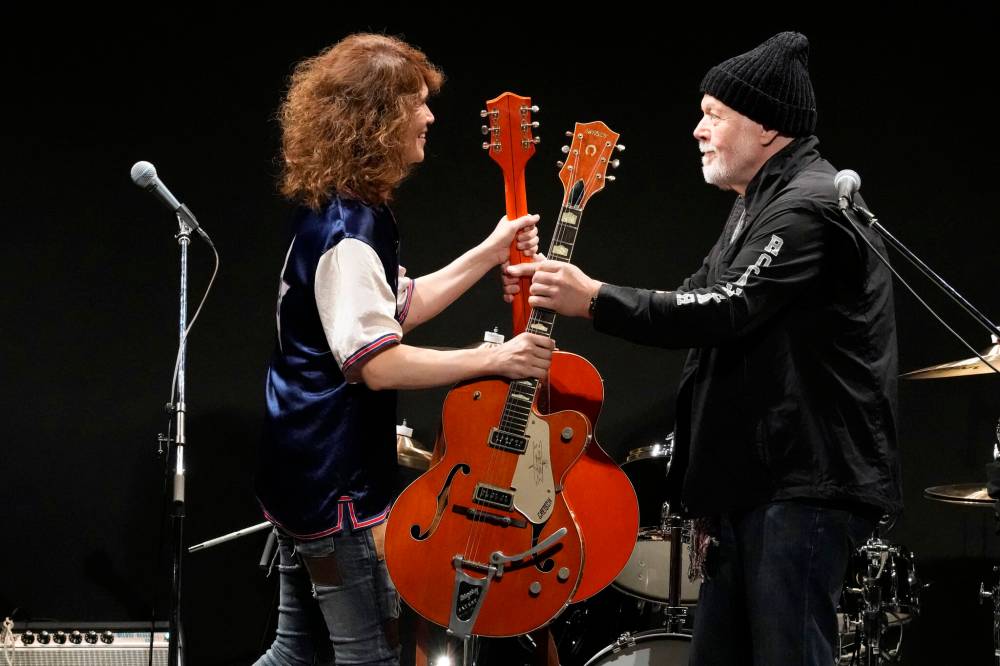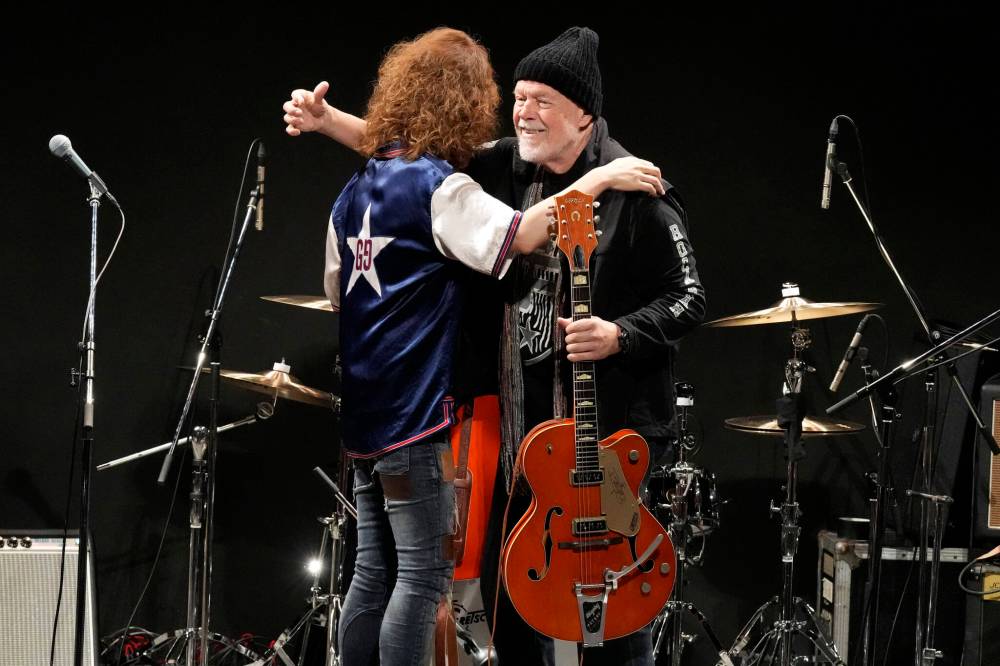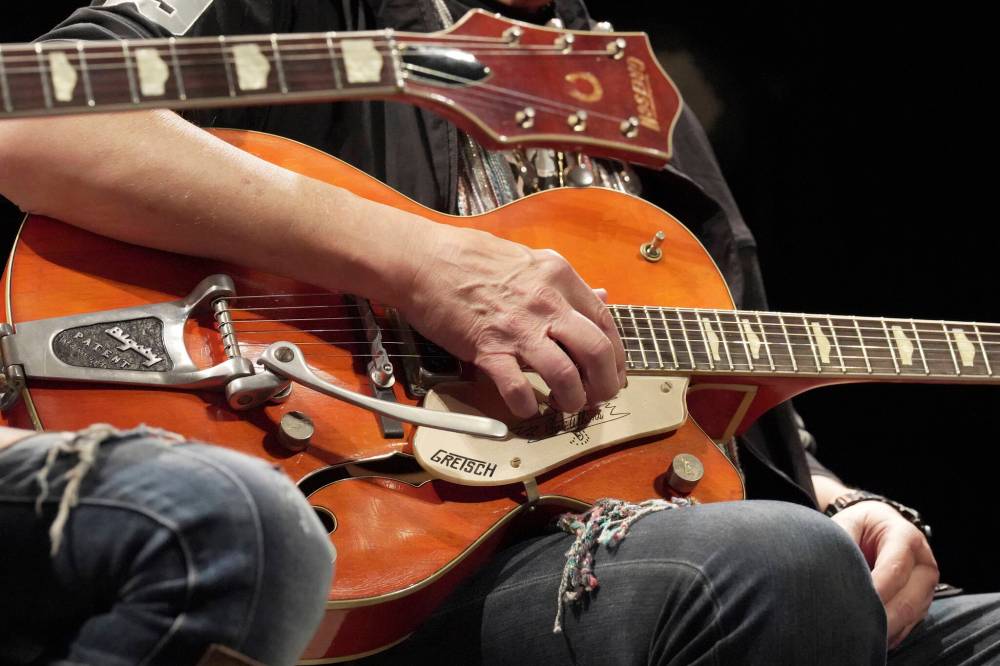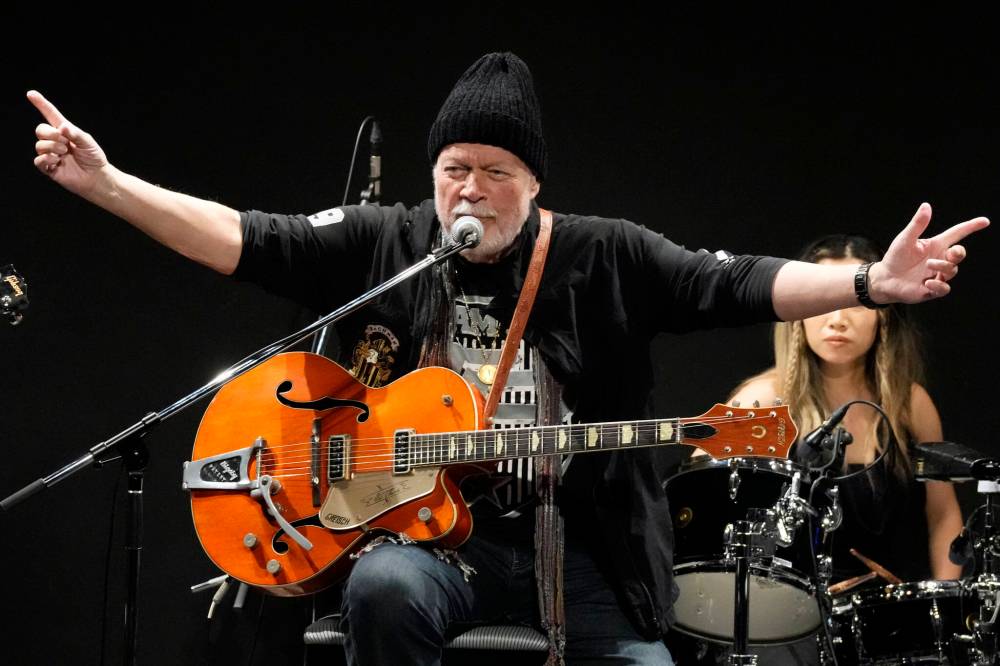Fret no more
Joyful coda for rocker Bachman as he is reunited with cherished guitar stolen 45 years ago
Advertisement
Read this article for free:
or
Already have an account? Log in here »
To continue reading, please subscribe:
Monthly Digital Subscription
$19 $0 for the first 4 weeks*
- Enjoy unlimited reading on winnipegfreepress.com
- Read the E-Edition, our digital replica newspaper
- Access News Break, our award-winning app
- Play interactive puzzles
*No charge for 4 weeks then billed as $19 every four weeks (new subscribers and qualified returning subscribers only). Cancel anytime.
Read unlimited articles for free today:
or
Already have an account? Log in here »
Hey there, time traveller!
This article was published 03/07/2022 (659 days ago), so information in it may no longer be current.
Randy Bachman’s six-string saga that’s almost 60 years old reached a cheerful final chord on Canada Day.
It was at the Canadian embassy in Tokyo Friday when he was reunited with the orange 1957 Gretsch 6120 Chet Atkins electric guitar he first ogled in a Winnipeg music shop in 1964.
He eventually bought the instrument for $400 and performed with it during his days with the Guess Who and Bachman-Turner Overdrive before it was stolen from his hotel room in Toronto in 1977.
https://www.youtube.com/watch?v=RPMJ3AueOmkhttps://www.youtube.com/watch?v=ubbBJfQ5JOo
“My girlfriend is right there,” said Bachman, 78, as the Gretsch guitar on which he wrote American Woman, These Eyes and other hits was handed to him by TAKESHI, a Japanese musician who had bought it at a Tokyo store in 2014 without knowing its history.
“It made my whole life. It was my hammer and a tool to write songs, make music and make money,” Bachman told The Associated Press before the handover.
– – –
The Gretsch’s journey begins in 1964, Bachman said in an interview with the Free Press last August, prior to the Unite 150 concert at Shaw Park, where he performed with his old Guess Who bandmate Burton Cummings.
This was well before Bachman came up famous riffs for American Woman or These Eyes with the Guess Who. He was just another teenager with rock ’n’ roll dreams and was in awe of another Winnipeg guitar legend, Lenny Breau.
Breau also played an orange Chet Atkins Gretsch, Bachman recalled, and he wanted one just like it.
“Every Saturday, I would take the bus and get off on Kennedy, and go to Hudson’s Bay, upstairs at the Paddlewheel and I’d meet Neil Young there,” Bachman said, adding they would chat about their Friday night gigs with Cummings.
Bachman was with Chad Allan and the Expressions, Young fronted the Squires and Cummings played the piano with the Deverons.
They’d make their way along Portage Avenue and check out record shops and music stores and would eventually stop at Winnipeg Piano, which in 1964 was at the corner of Portage and Edmonton Street.
“We would always stop at Winnipeg Piano, look in the window and gaze at the orange Gretsch guitar there and dream about it,” Bachman said. “We would look in the window, literally, for an hour looking at it sideways, up and down like it was a new car.”

The guitar was a big step up in quality for Bachman and so was its $400 price tag, a fortune for a 19-year-old whose main income was from community hall shows.
“I had to work so hard to get it. I had a paper route. I babysat my cousins. I mowed lawns and I worked at the North Main car wash from six in the morning till six in the evening for $10,” he said. “This guitar meant everything to me.”
He eventually got the money to buy it and only a few months later, Bachman would play the guitar on a recording of Shakin’ All Over with Chad Allan and the Expressions, but the single was labelled as “Guess Who?” as a publicity stunt. The band’s name stuck and the band would become one of Canada’s most successful rock acts.
Bachman would play the Gretsch on These Eyes, American Woman and dozens of other Guess Who songs, and later with Bachman-Turner Overdrive in the 1970s.
– – –
Bachman would eventually buy dozens guitars over the years — his black Gibson Les Paul from the late 1960s that he says is worth a million dollars is part of the collection at the National Music Centre museum in Calgary — but he cherished that orange Gretsch because of the effort it took to buy it.
He would take extreme measures to prevent it from being stolen on tour.
“I’d carry with me 16 pounds of a tow-truck chain and two gigantic locks, so if I had to leave the hotel room, I’d put it in the bathroom, wrap the chain through the handle of the guitar case and around the toilet twice and put two locks on it,” he said.
“If anyone wanted to steal that guitar, they’d have to rip the toilet out.”

He says one day a roadie put the guitar in a Toronto hotel room in 1977 and five minutes later the orange Gretsch was gone.
“I cried for three days. It was part of me,” Bachman told The Associated Press on Canada Day. “It was very, very upsetting.”
– – –
The search for the orange Gretsch would become a 40-plus year obsession for Bachman, who would go on to purchase almost 400 Gretsch guitars from pawn shops and guitar dealers over the years hoping to find it.
“It becomes my mid-life crisis, my compulsion to find my Gretsch,” Bachman said, who filled the basement of his old home in White Rock, B.C., with them. “I had a wall of white Gretsches, I had a wall of orange ones, I had a wall of blond ones.”
The Gretsch Foundation would eventually purchase many of Bachman’s Gretsch guitars and they were part of a museum exhibition in Nashville in 2016.
Still, that orange Gretsch eluded Bachman, even though he offered a big reward for it in an interview with Rolling Stone magazine.
Bachman began mentioning the guitar on YouTube videos he put together with his son Tal in 2020 and a fan, along with 21st-century technology, led to a new lead.
A video from 1976 of BTO’s Looking Out for No. 1, which has Bachman playing that orange Gretsch just weeks before it was stolen, proved to be the starting point in the new search, Bachman said.

The fan, William Long, used a small spot in the guitar’s wood grain visible in old images as a “digital fingerprint” and tracked the instrument down to a vintage guitar shop in Tokyo. A further search led him to a YouTube video showing the instrument being played by a Japanese musician, TAKESHI, in December 2019.
After receiving the news from Long, Bachman contacted TAKESHI immediately, and recognized the guitar in a video chat they had.
“I was crying,” Bachman said. “The guitar almost spoke to me over the video, like, ‘Hey, I’m coming home.’”
TAKESHI agreed to give it to Bachman in exchange for one that was very similar. So Bachman searched and found the guitar’s “sister” — made during the same week, with a close serial number, no modifications and no repairs.
“To find my guitar again was a miracle, to find its twin sister was another miracle,” Bachman said at the Tokyo handover.
TAKESHI said he decided to return the guitar because as a guitar player he could imagine how much Bachman missed it.
“I owned it and played it for only eight years and I’m extremely sad to return it now. But he has been feeling sad for 46 years, and it’s time for someone else to be sad,” TAKESHI said. “I felt sorry for this legend.”
He said he felt good after returning the guitar to its rightful owner, but it may take time for him to love his new Gretsch as much as that one.
“It’s a guitar, and it has a soul. So even if it has the same shape, I cannot say for sure if I can love a replacement the same way I loved this one,” he said. “There is no doubt Randy thought of me and searched hard (for the replacement), so I will gradually develop an affection for it, but it may take time.”

Bachman said he and TAKESHI are now like brothers who own guitars that are “twin sisters.” They are participating in a documentary about the guitar on which they plan to perform a song, Lost and Found, together.
They also performed several songs at Friday’s handover, including American Woman.
Bachman said he will lock the guitar up in his home so he will never lose it again. “I am never ever going to take it out of my house again,” he said.
— With files from The Associated Press
Alan.Small@freepress.mb.ca
Twitter: @AlanDSmall

Alan Small
Reporter
Alan Small has been a journalist at the Free Press for more than 22 years in a variety of roles, the latest being a reporter in the Arts and Life section.


